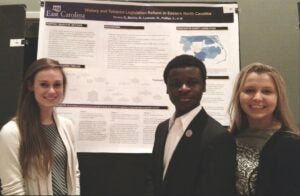May 26, 2016
Examining Public Health Policies and Outcomes
By Brice Bowrey, freshman EC Scholar
 Since 1995, the first full week of April has officially been National Public Health Week. This week is intended to be a time where the public health community can come together to celebrate advancements in the field and highlight areas where improvements can still be made. A critical part of achieving these objectives is conducting research to examine topics such as the effectiveness of certain public health policies or how various external factors affect public health policies and outcomes. Conducting research like this is exactly what one Brody School of Medicine professor of public health, two graduate students and I have been doing since Fall 2015.
Since 1995, the first full week of April has officially been National Public Health Week. This week is intended to be a time where the public health community can come together to celebrate advancements in the field and highlight areas where improvements can still be made. A critical part of achieving these objectives is conducting research to examine topics such as the effectiveness of certain public health policies or how various external factors affect public health policies and outcomes. Conducting research like this is exactly what one Brody School of Medicine professor of public health, two graduate students and I have been doing since Fall 2015.
Our research began as an offshoot of a larger project, but eventually we decided that our findings were significant enough to deserve a poster presentation of their own. We decided to title the research “History and Tobacco Legislation Reform in Eastern North Carolina.” As the title suggests, the poster we created focused on how various historical, cultural, financial and political factors affected the strength of tobacco legislation in various North Carolina counties.
By examining legislation, looking at statistical data and conducting interviews with stakeholders and policymakers, we sought to fully understand why some counties have far more robust and effective tobacco legislation than others. In the end, we found some key facilitators and barriers that can lead to strong or weak tobacco control laws.
We went to present this research at both the ECU Public Health Research Symposium and the Public Health Conference held at UNC-Wilmington in honor of National Public Health Week. This conference consisted of a poster showcase, two speakers and, of course, time to meet and greet everyone in attendance.
During the poster showcase, we were able to display our research alongside dozens of other students from various disciplines such as nursing, public health and physical therapy. Both speakers were fascinating, but one gave a particularly interesting presentation about chemotherapy and exercise. She discovered that, surprisingly, physical activity is very beneficial to patients undergoing chemotherapy, so she is currently working to create programs to get chemotherapy patients up and active.
In addition to these great speakers, I had a wonderful opportunity to meet a number of Masters of Public Health degree students from both the ECU and UNCW graduate schools. Overall, assisting in research and participating in the UNC Wilmington Public Health Conference were very interesting and informative experiences. I am very thankful that I had these opportunities.
